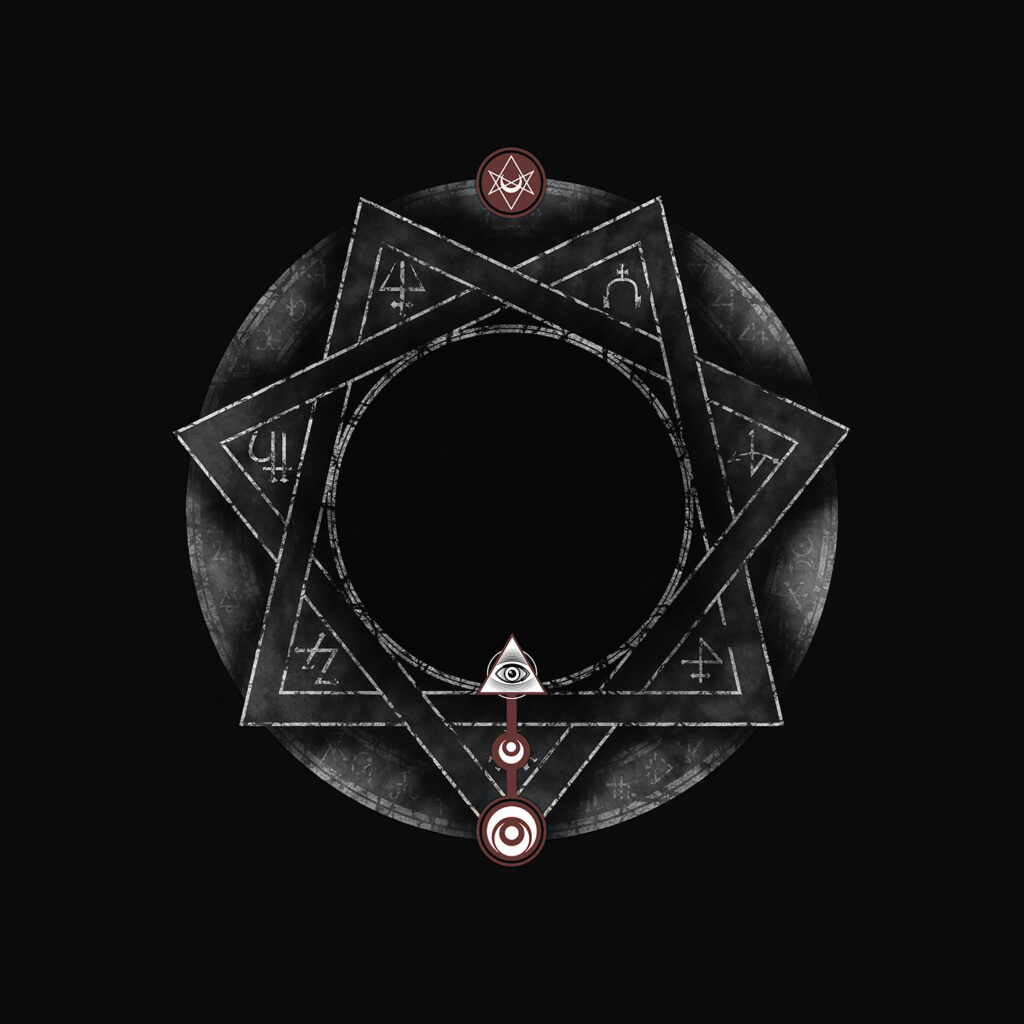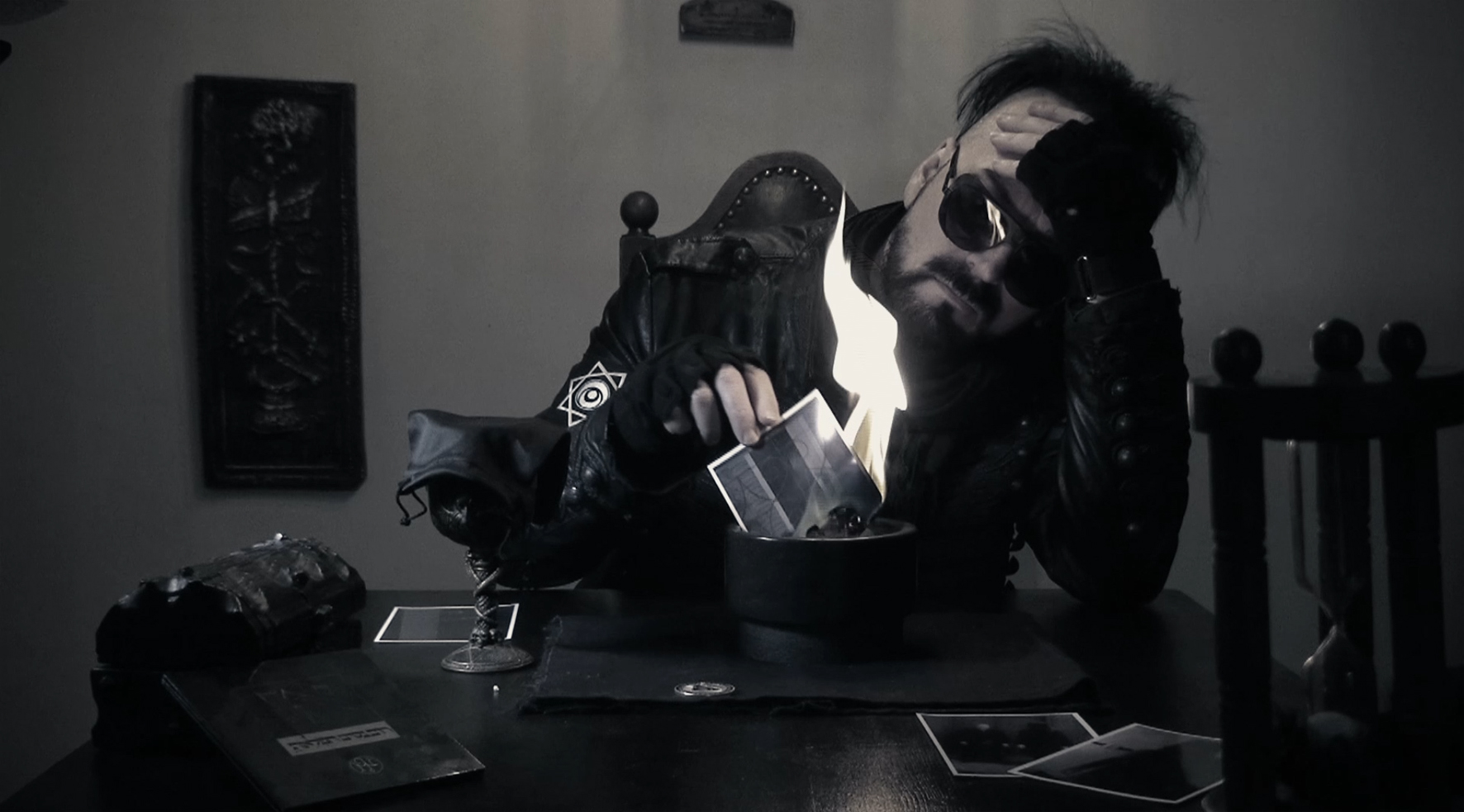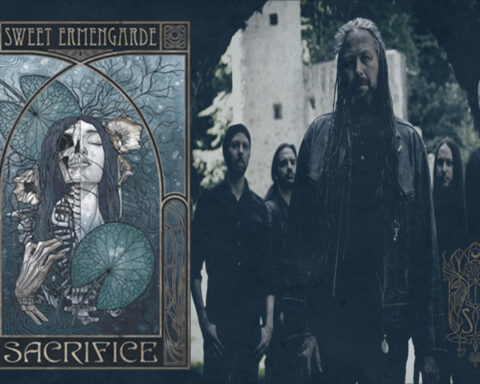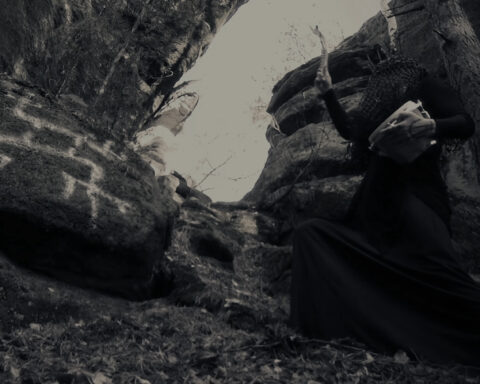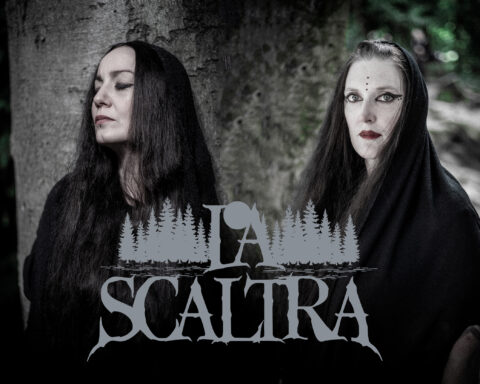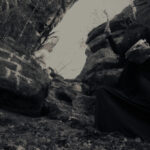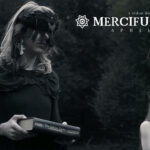[german version – english below]
„What if life did not originate on earth?“ – Mit dieser Frage eröffnet das 11. Album der MERCIFUL NUNS, das den ominösen Namen KVLTAN trägt. Artaud Seth, kreativer Kopf, Mentor und Visionär hinter der Band begleitet uns auf eine Reise an die Anfänge unserer menschlichen Zivilisation, an den Ursprung allen irdischen Seins. Warum existieren wir? Woher kamen wir? Was war oder könnte der „Missing Link“ zwischen einem einfachen, nativen Leben und den sich explosionsartigen entwickelten ersten Hochkulturen in Mesopotamien sein? Warum erzählen nahezu sämtliche späteren Weltreligionen von „Göttern, die aus dem Himmel“, dem Weltall, kamen, unabhängig voneinander entstanden und ohne jegliche Berührungspunkte der verschiedenen Kulturen? Und warum sind wir so fixiert darauf, dass intelligentes Leben hier auf der Erde seinen Anfang nahm? Was macht uns da so sicher? Um Antworten zu finden, muss man die richtigen Fragen stellen!
„Shaman elders speak of beings from the stars from the marble towers they sing of lost Kvltan.“ Artaud Seth
Ein Interview von Karin Hook für Sonic Seducer und Vince Stooss, Solar Lodge.
Sarru mass Artaud.
Artaud: Ia sarru mass Karin!
Was heißt das eigentlich, „Sarru mass“? Artaud: So begrüßen wir uns innerhalb der Lodge. Mittlerweile hat sich das verselbstständigt und ich werde so schon auf der Straße gegrüßt. Durch die ganzen Interviews, die wir beide schon machen durften, gehörst Du jedenfalls nun zu uns.
Und wenn ich gar nicht will? Artaud: Auch dann.
Artaud, wie geht es Dir in diesen politischen und gesellschaftlichen schwierigen Zeiten? Beängstigt Dich das aktuelle Geschehen? Artaud: Angst habe ich tatsächlich vor fast nichts. Natürlich treiben mich Dinge um. Die erzeugen bei mir aber eher ein Gefühl der Ohnmacht und Wut. Die aktuelle politische, ökonomische und auch pandemische Situation erinnert fatal an die 20er und 30er Jahre des letzten Jahrhunderts. Und das waren sicher keine guten Jahre und wir haben nichts, aber auch gar nichts daraus gelernt. Zudem zerstören wir unsere Lebensgrundlage, die Natur, gerade nachhaltig. Der Mensch ist naiv, nicht lernfähig und schlicht zu doof, um zu erkennen, dass wir uns gerade selbst langsam, aber sicher auslöschen. Außerdem bin ich die ganzen machtversessenen Autokraten überdrüssig. Vielleicht sollten wir Macht nur noch in Frauenhände geben. Ich bin mir sicher, dass die Welt dann signifikant friedlicher, liebens- und lebenswerter wäre.
Eine interessante Idee! Ist Artaud ein Feminist? Artaud: Ich halte Frauen jedenfalls für das bessere Geschlecht. Macht mich das jetzt gleich zu einem Feministen? Das ist kein Feminismus, sondern Realismus. Wer sind denn die Autokraten dieser Welt? Das sind allesamt Männer. Egoistische, machtversessene Primaten, die die Macht des Stärkeren propagieren. Und das, ohne jegliche Rücksicht auf das Befinden anderer. Nur der eigene Machterhalt oder der Ausbau jener, treibt sie an.
„somewhere out there we started again to bring a higher life to earth!“ Artaud Seth
Kommen wir nun aber zum Kern dieses Interviews, KVLTAN! Ich denke, das Album ist ein wirklich besonderes Album geworden. Eines, was zum Nachdenken anregt, und gleichwohl den Hörer auf eine Reise in eine Zeit vor der Zeit mitnimmt. Wer oder was ist „KVLTAN“? Artaud: Geschichte beginnt meistens am Anfang. Sie hat einen Erzähler, einen Chronisten, einen Überbringer. Doch diese Geschichte hat nichts davon. Sie liegt tief vergraben im Vergessenem und offenbart sich dennoch so offensichtlich lebendig direkt vor unseren Augen. KVLTAN könnte eine plausible Antwort auf noch ungeklärte Menschheitsfragen sein. Warum existieren wir? Woher kamen wir? Und warum sind wir so fixiert darauf, dass intelligentes Leben hier auf der Erde seinen Anfang nahm? Was macht uns da so sicher? Der Schlüssel zu den Antworten liegt darin, die richtigen Fragen zu stellen!
Dazu passt der erste Satz, der KVLTAN eröffnet: „What if life did not originate on earth?“ Eine tiefgründige Frage, rund um eine These, dass die Menschheit ihren Ursprung nicht auf der Erde hatte, sondern aus den Tiefen des Weltalls, was zumindest tiefgläubige Menschen eher verschrecken können. Woran machst Du diese These fest? Artaud: Wie erschreckend war es für die Menschheit, als sie erfuhren, auf einer kleinen Kugel inmitten eines endlosen Kosmos zu wohnen? Akzeptanz folgt aus Wissen. Und was wissen wir denn schon wirklich? KVLTAN möchte eine Geschichte erzählen. Eine, wie sie hätte sein können. Vielleicht sogar eine, die sich tatsächlich so zugetragen hat. In jedem Falle, eine, die Dich zum Träumen bringen soll.
Kannst du bitte etwas zum Konzept des Albums erzählen? Worum geht es bei „KVLTAN“? Artaud: Ich denke, das erklärt sich am besten, wenn man sich das Album anhört. Primär erzählt es von dem hochentwickelten Stamm der KVLTANIANS, die ihre Heimstätte durch massive Umweltzerstörungen unbewohnbar machten und sich gezwungen sahen, einen neuen Siedlungsraum zu erschließen. Ihre Wahl fiel auf die Erde, wo sich gerade eine naive Bevölkerung ausbreitete. Diese frühen Menschen hielten die Ankömmlinge für Götter und nannten sie, die Anunnaki. Um diese, sowie dessen Auswirkungen auf nachfolgende Religionen, dreht sich KVLTAN.
Passenderweise eröffnet der Song KVLTAN – the origin (der Ursprung) das Album. Welches ist der Song des Albums, der für dich die größte Bedeutung hat und weshalb ist das so? Artaud: Das Album fordert schon eine gewisse Aufmerksamkeit vom Hörer ab. Darüber bin ich mir bewusst. Es war mir von Anfang an klar, dass ich hier ein außergewöhnliches Album schreiben möchte. Eines, das wie aus einem Guss, überraschend und irgendwie auch extraterrestrisch klingen soll. Da war es schon schwierig zwei Songs als Videosingles auszuwählen, da das Album tatsächlich nur in Gänze funktioniert. Jetzt einen Song besonders hervorzuheben, fällt mir jedenfalls noch schwerer. Dafür sind die Songs auch zu unterschiedlich. Bei der Auswahl einer Single hat man wenigstens das Kriterium der Zugänglichkeit eines Songs, welche eine Wahl erleichtern kann. Ich kann Dir ja nicht mal einen Lieblings-Song vom Album nennen. Und um es noch besser zu erklären: es gab nicht mal einen ersten und letzten Song, da wir an allen gleichzeitig gearbeitet haben. Das ist vielleicht auch eine Erklärung dafür, warum KVLTAN so in sich geschlossen klingt.
„A Sermon From Another Dimension“ hat mich musikalisch mitgerissen, aber auch überrascht. Ich meine sogar psychedelisch-tranceartige Einflüsse wahrnehmen zu können. Wie siehst du das? Artaud: Ich versuche grundsätzlich die Thematik eines Songs in Einklang mit der Musik zu bringen. Die Kontaktaufnahme mit der Vergangenheit erfolgt durch mediatives Träumen. So wird KVLTAN visualisiert und in unser Bewusstsein zurückgeholt. Zwischen unseren verborgenen Erinnerungen und den alten Göttern von KVLTAN liegt der Schlaf, bewacht von den Wächtern der Sphären. Sie zu durchwandern ist das Ziel, um das Vergessene wieder an das Licht des Erinnerns zu bringen.
„dreaming of great pyramids in a darkly shining world on the other side of the eye we fly… high!“ Artaud Seth
Was hat es in diesem Zusammenhang mit den Schwestern des Schlafes, Myrrhine und Inanna auf sich? Artaud: Der Mythos um die Schwestern des Schlafes Myrrhine und Inanna, entspringt der Sumerisch-Akkadischen Legende, in der die Oberen der Mesopotamischen Stadtstatten Ur und Uruk versuchen die Götter mit Hilfe der Psychonautik zu kontaktieren. Dieser Zustand zwischen Trance, Schlaf und Meditation dient der Erforschung der eigenen Psyche und des Unbewussten um eine gemeinsame Plattform mit den „schlafenden Göttern“ zu schaffen. Inanna gelingt es, Anu („der, der vom Himmel fiel“) zu erwecken und ihn davon zu überzeugen, die Stadt Uruk zu verschonen. Ihre Schwester Myrrhine gelang das jedoch nicht und Ur war dem Untergang geweiht. Diese Legende, wie auch andere Sumerisch-Akkadische Mythen um gefallene Engel oder die, der Großen Flut, fanden später, in abgewandelter Form, Eingang in das christliche Alte Testament. Myrrhine ist die Einzige, die weiß, wann die Götter auf Erden wieder erwachen werden!
„open the book of entrance turning page after page read from all the arcane knowledge of forgotten days in Ares´ haze“ Artaud Seth
Neben „A Sermon…“ ist „Down Dark Hallways“ einer meiner Lieblingssongs. Kannst du bitte ein wenig mehr über das sehr gelungene Video dazu erzählen? Artaud: Das Video haben wir fernab von jeglicher Zivilisation inmitten des Thüringischen Waldes in einer aus dem 17. Jahrhundert stammenden Mühle gedreht und zeigt das Zusammenleben von Neophyten (Anwärterinnen) und deren Meisterin (Myrrhine) unter dem Glaubensdogma KVLTANs. Vier Tage lang hat sich hier die Band samt Filmcrew der Askese verschrieben und unter widrigsten Umständen auf das Projekt eingelassen. Das waren recht intensive Drehtage und ich finde, das Ergebnis kann sich wirklich sehen lassen.
Wie darf ich mir das vorstellen? Kannst Du diese Enthaltsamkeit, die Askese näher beschreiben? Artaud: Da war einfach nichts im Umkreis von 30 Kilometern. Nur Wald, ein Bach und eine alte Mühle. Wir mussten uns mit dem begnügen, was vor Ort war oder wir mitgebracht hatten. Es gab keinen Internetempfang, kein Radio oder Fernsehen… nichts. Nur wir, die Natur und das Video.
„she walked down the ancient hall with arcane knowledge to the dawn she passes our ancestors to the origin of all.“ Artaud Seth
Was ist die Martian Genesis? Artaud: Im Allgemeinen wird die Genesis, die Schöpfungsgeschichte, mit der Erde verbunden. Doch schaut man sich die Überlieferungen früher Hochkulturen genauer an, erkennt man, dass der eigentliche Ursprung des intelligenten irdischen Lebens eher von „Außen“ hineingetragen wurde. Der Mars als „Göttersitz“ spielt hierbei in zahlreichen Überlieferungen eine zentrale Rolle. Der Mars besaß einst ein völlig anderes Klima als heute. Er war zumindest zeitweilig warm und feucht, besaß flüssiges Wasser sowie ein schützendes Magnetfeld und er lag – wie sein Schwesterplanet, die Erde – in der habitablen Zone, die Leben erst ermöglicht. Es ist somit vorstellbar, dass die mythischen Überlieferungen über den Ursprung der Götter, einen wahren Kern haben.
„in the name of the kvltanian angels come and rise up before us i command you in the name of Phobos with the martian strength of Deimos.“ Artaud Seth
Wie lange hast Du eigentlich an KVLTAN gearbeitet? Artaud: Von der Idee bis zum finalen Mixing dürfte das bald ein Jahr gewesen sein. Und das, nahezu täglich.
Wie darf ich mir das vorstellen? Wie ein Nine to Five Job? Artaud: Kann man so sagen. Ich benutze kaum Werkssounds, sondern manipuliere und bearbeite sämtliche Sounds, sei es vom Synthesizer, den Gitarren, den Drums Machines und Plug Ins, zu etwas eigenem. Damit kreiere ich dann Soundscapes, vergleichbar vielleicht mit cineastischen Soundtracks, die ich dann auf mich wirken lassen und in einen kompletten Song aufgehen lasse. Das ist alles sehr aufwändig und braucht Zeit. Das steht übrigens im krassen Gegensatz zu den Aufnahmen des Debüt Album LIBER I, was eine ganz andere Herangehensweise hatte. Das Album damals wurde in wenigen Wochen eingespielt.
Würdest Du das als „normale Evolution“ innerhalb einer Bandgeschichte bezeichnen? Artaud: Mag sein. Konzeptalben zu schreiben ist jedenfalls deutlich fordernder, und auch befriedigender irgendwie. Man kann aber auch mit einfacheren Mittel gute Songs schreiben. Ich mag zum Beispiel NUNHOOD oder GOD AEON vom Debut Album immer noch sehr.
Die klingen, wie das gesamte Album LIBER I, sehr nach den 80ern… Artaud: Das war der Plan.
Welches hältst Du für Euer bestes Album? Artaud: Schwierig zu sagen. THELEMA, EXOSPHERE, KVLTAN natürlich. Auf ANOMALY sind viele bekannte Songs drauf, METEORA war sehr erfolgreich. Das kommt auch auf meine Stimmung und die Uhrzeit an. GOETIA V funktioniert sicher nicht zum Frühstück. Das Album sticht schon durch seine Andersartigkeit heraus. Das hat schon fast meditative Züge.
Kannst du bitte näher auf das Cover-Artwork und dessen Bedeutung eingehen? Artaud: Das Artwork stammt wie immer von mir selbst. Ich habe versucht KVLTAN zu visualisieren und dem Stamm der KVLTANIANS ein Erkennungs-Symbol zu geben. Dieses befindet sich auf dem Frontcover. Im Innersleeve findet man archaische Malerei, die die Annunaki, auch Riesen genannt, zeigen.
Wer oder was sind die Giants, die immer wieder auf Eurem Coverartwork erscheinen? Es heißt im begleitenden Info, sie sollen riesengroß gewesen sein. Deutlich über drei Meter. Sie hatten eine helle Haut, blaue Augen und sie sollen sechs Finger gehabt haben. Artaud: Sie sind mythologischer Natur und ich habe sie zum Leben erweckt, um ihnen eine komplettere Geschichte zu geben, als es die Sumerer vor 5000 Jahren taten. Ihr Heimatplanet, Kvltan, lebte unter der Regierung eines einzigen Königs, Anu, und litt unter einem schleichenden Klimawechsel, der zuerst zu großen Niederschlägen und später zur langsamen Austrocknung des Planeten führte. Am Ende stand der Verlust der Atmosphäre und der Planet wurde zu dem roten Planeten, wie wir ihn heute kennen: dem Mars. Die Anunnaki waren also schon früh gezwungen sich nach einer neuen Heimstätte umzuschauen und sie siedelten sich auf der Erde an. Der frühe Mensch war zur damaligen Zeit noch nicht viel mehr als ein tierähnliches Wesen mit nicht sehr ausgeprägtem Intellekt. Doch sie lernten über die Jahrtausende von den Astronautengötter und kopierten deren Lebensweise. Der sumerischen Überlieferung zufolge entsprang ab etwa dem 4. Jahrtausend vor Christus eine neue Linie der Menschheit von der Vermischung der Anunnaki mit den späten Homo Sapiens, die den heutigen Menschen hervorbrachte.
Da drängen sich Parallelen zur jetzigen Zeit auf. „Schleichender Klimawandel“, Erderwärmung, ein Planet der langsam unbewohnbar wird. Absicht? Artaud: Vielleicht können wir aus der fiktiven Geschichte der Kvltanier was lernen. Wir haben keine zweite Erde in erreichbarer Nähe, wie sie es hatten. Wir haben keine Fluchtmöglichkeit, keine Option B, keinen alternativen Lebensraum! Unser Schicksal ist unteilbar mit unserem Planeten, der Erde verbunden. Das sollte uns Bewusst sein.
Teilst Du die Einschätzung vieler Wissenschaftler dahingehend, dass sich das Zeitfenster des Handelns rapide verkleinert? Artaud: Klar, dem ist so. Dabei lägen die Lösungen schon längst auf dem Tisch. Es fehlt am politischen und ökonomischen Willen das umzusetzen. Was hat eigentlich der Mensch auf den Osterinseln im Pazifik vor 800 Jahren gedacht als er den letzten Baum auf seiner Insel fällte, wohl wissend damit das Ende seiner Zivilisation besiegelt zu haben?
„Olympus Mons Peak“ ist der perfekte Ausklang: Kannst du mir bitte etwas über diesen meditativen, ruhigen Song und seine Bedeutung erzählen und den Satz „we are the last of us“ erläutern? Wer sind „die letzten ihrer Art“? Artaud: Diese Rasse der „Letzten der Suchenden“ begleitet mich eigentlich schon mein ganzes musikalisches Leben lang. Woher sie stammen oder was genau sie sind, weiß ich selbst nicht so genau. Jedenfalls sind sie ständig präsent. Vielleicht sind sie auch nur eine Metapher für Menschen wie mich, die fortwährend auf der Suche nach Antworten sind. Ich wäre jedenfalls bereit für den ultimativen Panoramablick vom Gipfel des symbolischen Berges der Erkenntnis; dem höchsten geologischen Punkt unseres Sonnensystems: dem Olympus Mons.
Eine schöne Metapher, wie ich finde. Erkenntnisse und Wissen scheinen Dir wichtig zu sein. Wir hingegen, wissen eigentlich sehr wenig von Dir. Privates scheint kaum existent. Warum ist das so? Artaud: Empfindest Du das so?
Anscheinend, sonst würde ich ja nicht fragen… Artaud: Bis auf die Banalitäten des Alltags steckt alles in meiner Musik. Man muss es nur filtern können, wenn man mir näher sein will.
Stören Dich solche Fragen? Artaud: Nein, ich finde nur die Antworten nicht sehr spannend.
Wie ist es zur Bonus CD gekommen und welche Bedeutung kommt ihr zu? Artaud: Wir hatten einfach zu viel Material geschrieben. Zudem war die Originalversion von THE KVLTANIANS mit 14 Minuten einfach zu lang für das Album. Die Videosingle Version zu KVLTANIANS war mit hingegen zu kurz. Insofern haben wir dann das ganze Material auf die Bonus CD gepackt und der limitierten Erstauflage des Albums beigelegt.
Wann und wo werden wir das neue Werk live erleben können? Artaud: Wir treten im Sommer 2022 auf dem PLAGE NOIRE am Weißenhäuser Strand, dem SINNERS DAY in Ostende, dem Stella Nomine in Torgau sowie auf der CONVENTION III in Bochum auf. Mehr Informationen dazu unter www.MercifulNuns.com.
Was bleibt? Ist es die Erinnerung an das Vergessene? Sind es die Träume der Vergangenheit, gespeist aus Legenden und Mythen, die uns der Wahrheit näherbringen? Wollen wir wirklich wissen? Und kann unser Geist dann die Komplexität des Wissens über unser Sein, unserer Herkunft und der daraus resultierenden Zukunft wirklich fassen? Wären wir reif für die Offenbarung? Wären wir reif für den ultimativen Rundumblick vom symbolischen Berg der Erkenntnis: dem Olympus Mons Peak? Und wären wir dann auch reif „raumfahrende“ Götter zu sein, wie einst unsere Vorfahren, die aus dem Weltall kamen? Wie sagte Artaud vorhin passenderweise: „KVLTAN möchte eine Geschichte erzählen. Eine, wie sie hätte sein können. Vielleicht sogar eine, die sich tatsächlich so zugetragen hat. In jedem Falle, eine, die Dich zum Träumen bringen soll.“
In diesem Sinne…
„we can shake the earth and move the sun!“ Artaud Seth
[english version – german above]
“What if life did not originate on earth?” – With this question, the 11th album of the MERCIFUL NUNS, bearing the ominous name KVLTAN, begins. Artaud Seth, the creative mind, mentor, and visionary behind the band, takes us on a journey to the beginnings of our human civilization, to the origin of all earthly existence. Why do we exist? Where did we come from? What was or could be the „Missing Link“ between a simple, native life and the rapidly developing early high cultures in Mesopotamia? Why do nearly all later world religions speak of „gods who came from the sky,“ from space, independently created and without any contact between different cultures? And why are we so fixated on the idea that intelligent life began here on Earth? What makes us so sure? To find answers, one must ask the right questions!
“Shaman elders speak of beings from the stars from the marble towers they sing of lost Kvltan.” – Artaud Seth
An interview by Karin Hook for Sonic Seducer and Vince Stooss, Solar Lodge.
Sarru mass Artaud.
Artaud: Ia sarru mass Karin!
What does „Sarru mass“ mean?
Artaud: That’s how we greet each other within the Lodge. By now, it has taken on a life of its own, and I am even greeted this way on the street. Through all the interviews we’ve done together, you certainly belong to us now.
And what if I don’t want to?
Artaud: Even then.
Artaud, how are you doing in these politically and socially challenging times? Are you frightened by current events? Artaud: I am actually afraid of almost nothing. Of course, things worry me. But they create a feeling of helplessness and anger rather than fear. The current political, economic, and pandemic situation fatally reminds me of the 1920s and 30s. And those were certainly not good years, and we have learned nothing, absolutely nothing, from them. Additionally, we are currently sustainably destroying our foundation of life, nature. Humans are naive, not capable of learning, and simply too stupid to realize that we are slowly but surely wiping ourselves out. Also, I am tired of all the power-obsessed autocrats. Maybe we should put power only in women’s hands. I am sure the world would be significantly more peaceful, lovable, and livable then.
An interesting idea! Is Artaud a feminist? Artaud: I certainly believe women are the better gender. Does that make me a feminist? That’s not feminism, it’s realism. Who are the autocrats of this world? They are all men. Selfish, power-hungry primates who propagate the power of the stronger. And that, without any regard for the well-being of others. Only the preservation of their own power or its expansion drives them.
“somewhere out there we started again to bring a higher life to earth!” – Artaud Seth
But now let’s get to the core of this interview, KVLTAN! I think the album has become a really special one. One that makes you think, and at the same time takes the listener on a journey to a time before time. Who or what is “KVLTAN”? Artaud: History usually begins at the beginning. It has a narrator, a chronicler, a transmitter. But this story has none of that. It lies deeply buried in the forgotten and yet reveals itself so obviously alive right before our eyes. KVLTAN could be a plausible answer to still unresolved questions of humanity. Why do we exist? Where did we come from? And why are we so fixated on the idea that intelligent life began here on Earth? What makes us so sure? The key to the answers lies in asking the right questions!
This fits well with the first sentence that opens KVLTAN: „What if life did not originate on earth?“ A profound question surrounding a thesis that humanity did not originate on Earth but from the depths of space, which could at least frighten deeply religious people. On what do you base this thesis?
Artaud: How terrifying was it for humanity when they learned they lived on a small ball in the midst of an endless cosmos? Acceptance follows knowledge. And what do we really know? KVLTAN wants to tell a story. One as it could have been. Maybe even one that actually happened. In any case, one that should make you dream.
Can you tell us something about the concept of the album? What is “KVLTAN” about? Artaud: I think it explains itself best when you listen to the album. Primarily, it tells of the highly developed tribe of the KVLTANIANS, who made their homeland uninhabitable through massive environmental destruction and were forced to find a new settlement space. Their choice fell on Earth, where a naive population was just beginning to spread. These early humans considered the newcomers as gods and called them the Anunnaki. KVLTAN revolves around them and their impact on subsequent religions.
Appropriately, the song KVLTAN – the origin opens the album. Which song on the album holds the greatest significance for you and why is that so? Artaud: The album already demands a certain level of attention from the listener. I am aware of that. From the beginning, it was clear to me that I wanted to write an extraordinary album. One that should sound cohesive, surprising, and somewhat extraterrestrial. So, it was already difficult to choose two songs as video singles, as the album truly only works as a whole. Now highlighting one song is even harder for me. The songs are too different for that. When selecting a single, you at least have the criterion of a song’s accessibility, which can make the choice easier. I can’t even name a favorite song from the album. To explain it better: there wasn’t even a first and last song since we worked on all of them simultaneously. That might also explain why KVLTAN sounds so cohesive.
“A Sermon From Another Dimension” captivated me musically, but also surprised me. I even think I can perceive psychedelic-trance influences. How do you see it? Artaud: I try to align the theme of a song with the music. The contact with the past takes place through meditative dreaming. This is how KVLTAN is visualized and brought back into our consciousness. Between our hidden memories and the ancient gods of KVLTAN lies sleep, guarded by the guardians of the spheres. Traversing them is the goal to bring the forgotten back to the light of remembrance.
“dreaming of great pyramids in a darkly shining world on the other side of the eye we fly… high!” – Artaud Seth
What is the story behind the Sisters of Sleep, Myrrhine, and Inanna? Artaud: The myth of the Sisters of Sleep, Myrrhine and Inanna, comes from the Sumerian-Akkadian legend, in which the leaders of the Mesopotamian city-states of Ur and Uruk try to contact the gods through psychonautics. This state between trance, sleep, and meditation serves to explore one’s own psyche and the unconscious to create a common platform with the “sleeping gods”. Inanna succeeds in awakening Anu (“the one who fell from the sky”) and convincing him to spare the city of Uruk. Her sister Myrrhine does not succeed, and Ur is doomed. This legend, like other Sumerian-Akkadian myths about fallen angels or the Great Flood, later found their way, in altered form, into the Christian Old Testament. Myrrhine is the only one who knows when the gods will awaken on Earth again!
“open the book of entrance turning page after page read from all the arcane knowledge of forgotten days in Ares’ haze” – Artaud Seth
Besides “A Sermon…”, “Down Dark Hallways” is one of my favorite songs. Can you tell us a bit more about the very well-done video for it? Artaud: We shot the video far away from any civilization in the middle of the Thuringian Forest, in a mill from the 17th century, and it shows the coexistence of Neophytes (initiates) and their master (Myrrhine) under the dogma of KVLTAN. For four days, the band and film crew dedicated themselves to asceticism under difficult conditions. Those were quite intense shooting days, and I think the result is really something to behold.
How should I imagine that? Can you describe this asceticism in more detail? Artaud: There was simply nothing within a 30-kilometer radius. Just forest, a stream, and an old mill. We had to make do with what was available on-site or what we brought with us. There was no internet reception, no radio or television… nothing. Just us, nature, and the video.
“she walked down the ancient hall with arcane knowledge to the dawn she passes our ancestors to the origin of all.” – Artaud Seth
What is the Martian Genesis? Artaud: In general, Genesis, the creation story, is associated with Earth. But if you look more closely at the traditions of early advanced civilizations, you can see that the true origin of intelligent terrestrial life was more likely introduced from „outside.“ Mars as the „seat of the gods“ plays a central role in numerous traditions. Mars once had a completely different climate than it does today. It was at least temporarily warm and moist, had liquid water and a protective magnetic field, and lay—in the habitable zone, like its sister planet, Earth—making life possible. It is thus conceivable that the mythical traditions about the origin of the gods have a grain of truth.
“In the name of the Kvltanian angels come and rise up before us I command you in the name of Phobos with the Martian strength of Deimos.” Artaud Seth
How long did you actually work on KVLTAN? Artaud: From the initial idea to the final mixing, it took about a year. And that, almost daily.
How should I imagine that? Like a nine-to-five job? Artaud: You could say that. I hardly use factory sounds but manipulate and process all the sounds, whether from the synthesizer, guitars, drum machines, and plugins, into something unique. I then create soundscapes, comparable perhaps to cinematic soundtracks, which I let work on me and turn into a complete song. It’s all very labor-intensive and takes time. Incidentally, this is in stark contrast to the recording of the debut album LIBER I, which had a completely different approach. The album back then was recorded in just a few weeks.
Would you call that a “normal evolution” within a band’s history? Artaud: Maybe. Writing concept albums is certainly more demanding, and also somehow more satisfying. But you can also write good songs with simpler means. For example, I still really like NUNHOOD or GOD AEON from the debut album.
They sound very 80s, like the whole album LIBER I… Artaud: That was the plan.
Which album do you consider to be your best? Artaud: That’s hard to say. THELEMA, EXOSPHERE, KVLTAN of course. ANOMALY has many well-known songs, METEORA was very successful. It also depends on my mood and the time of day. GOETIA V certainly doesn’t work for breakfast. The album stands out due to its uniqueness. It’s almost meditative.
Can you elaborate on the cover artwork and its meaning? Artaud: As always, the artwork is by me. I tried to visualize KVLTAN and give the tribe of the KVLTANIANS a recognition symbol. This is on the front cover. The inner sleeve features archaic paintings showing the Anunnaki, also called giants.
Who or what are the giants that appear repeatedly on your cover artwork? The accompanying info says they were very tall, well over three meters, had fair skin, blue eyes, and supposedly six fingers. Artaud: They are mythological in nature, and I brought them to life to give them a more complete story than the Sumerians did 5,000 years ago. Their home planet, Kvltan, lived under the rule of a single king, Anu, and suffered from a gradual climate change, which first led to heavy rainfall and later to the slow drying out of the planet. In the end, it lost its atmosphere and became the red planet as we know it today: Mars. The Anunnaki were thus forced early on to look for a new home, and they settled on Earth. Early humans at that time were little more than animal-like beings with not very developed intellect. But they learned over millennia from the astronaut gods and copied their way of life. According to Sumerian tradition, from around the 4th millennium BC, a new line of humanity emerged from the mixing of the Anunnaki with the late Homo sapiens, leading to the humans of today.
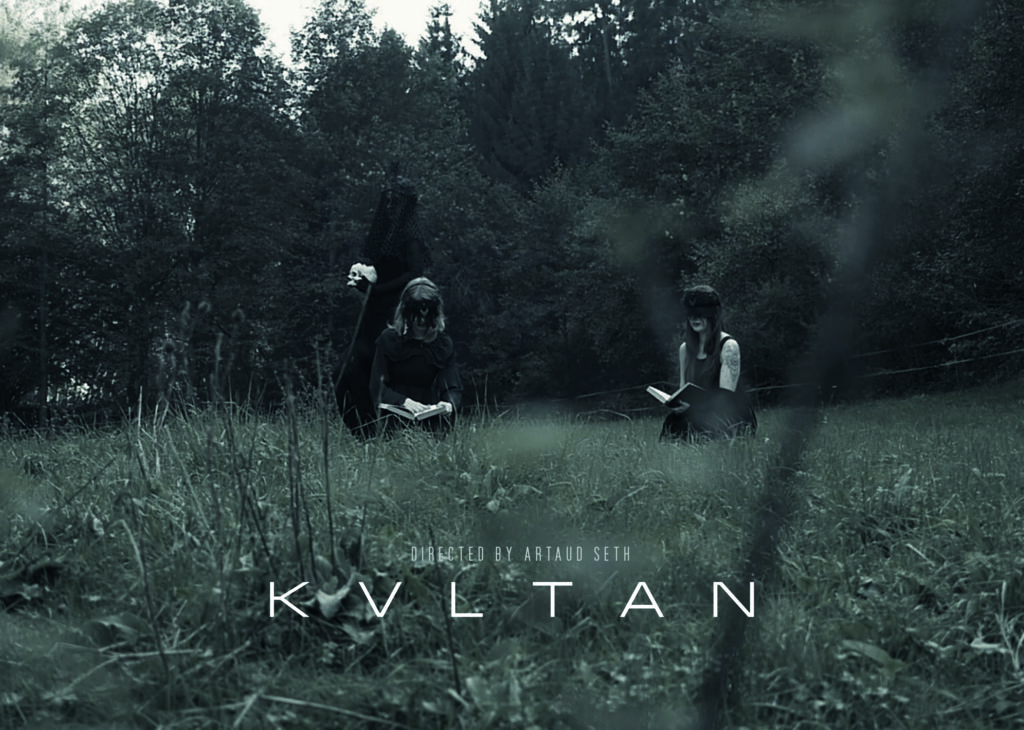
There seem to be parallels to the present time: “gradual climate change,” global warming, a planet becoming slowly uninhabitable. Was this intentional? Artaud: Maybe we can learn something from the fictional story of the Kvltanians. We don’t have a second Earth within reach like they did. We have no escape route, no Plan B, no alternative habitat! Our fate is inextricably linked with our planet, Earth. That should be clear to us.
Do you share the assessment of many scientists that the window for action is rapidly closing? Artaud: Yes, that’s true. The solutions have been on the table for a long time. It lacks the political and economic will to implement them. What did the people on Easter Island in the Pacific think 800 years ago when they cut down the last tree on their island, knowing full well that it sealed the end of their civilization?
„Olympus Mons Peak“ is the perfect conclusion: Can you tell me about this meditative, calm song and its meaning, and explain the phrase „we are the last of us“? Who are „the last of their kind“? Artaud: This race of „the last of the seekers“ has accompanied me throughout my musical life. Where they come from or what exactly they are, I don’t know for sure. They are constantly present. Maybe they are just a metaphor for people like me, who are constantly seeking answers. In any case, I would be ready for the ultimate panoramic view from the peak of the symbolic mountain of knowledge; the highest geological point in our solar system: Olympus Mons.
A beautiful metaphor, I think. Knowledge and insights seem important to you. However, we actually know very little about you. Private life seems almost non-existent. Why is that? Artaud: Do you feel that way?
Apparently, otherwise, I wouldn’t ask… Artaud: Apart from the banalities of everyday life, everything is in my music. You just have to be able to filter it if you want to get closer to me.
Do such questions bother you? Artaud: No, I just don’t find the answers very exciting.
How did the bonus CD come about and what is its significance? Artaud: We simply wrote too much material. Moreover, the original version of THE KVLTANIANS was simply too long for the album at 14 minutes. On the other hand, the video single version of KVLTANIANS was too short for me. So, we packed all the material onto the bonus CD and included it in the limited first edition of the album.
When and where can we experience the new work live? Artaud: We will perform in the summer of 2022 at PLAGE NOIRE at Weißenhäuser Strand, SINNERS DAY in Ostend, Stella Nomine in Torgau, and CONVENTION III in Bochum. More information at www.MercifulNuns.com.
What remains? Is it the memory of the forgotten? Are they the dreams of the past, nourished by legends and myths that bring us closer to the truth? Do we really want to know? And can our minds then grasp the complexity of the knowledge about our being, our origin, and the resulting future? Would we be ready for the revelation? Would we be ready for the ultimate panoramic view from the symbolic mountain of knowledge: Olympus Mons Peak? And would we then be ready to be „space-faring“ gods, like our ancestors who came from space? As Artaud aptly said earlier: “KVLTAN wants to tell a story. One that could have been. Maybe even one that actually happened. In any case, one that should make you dream.”
In this sense…
“We can shake the earth and move the sun!” Artaud Seth
